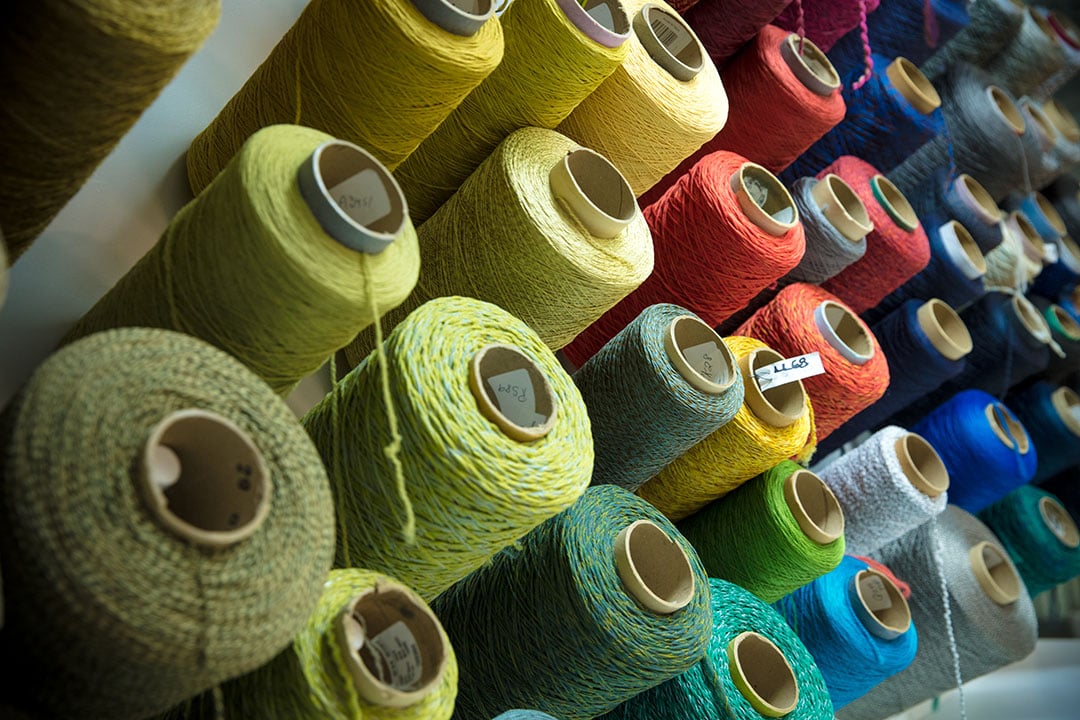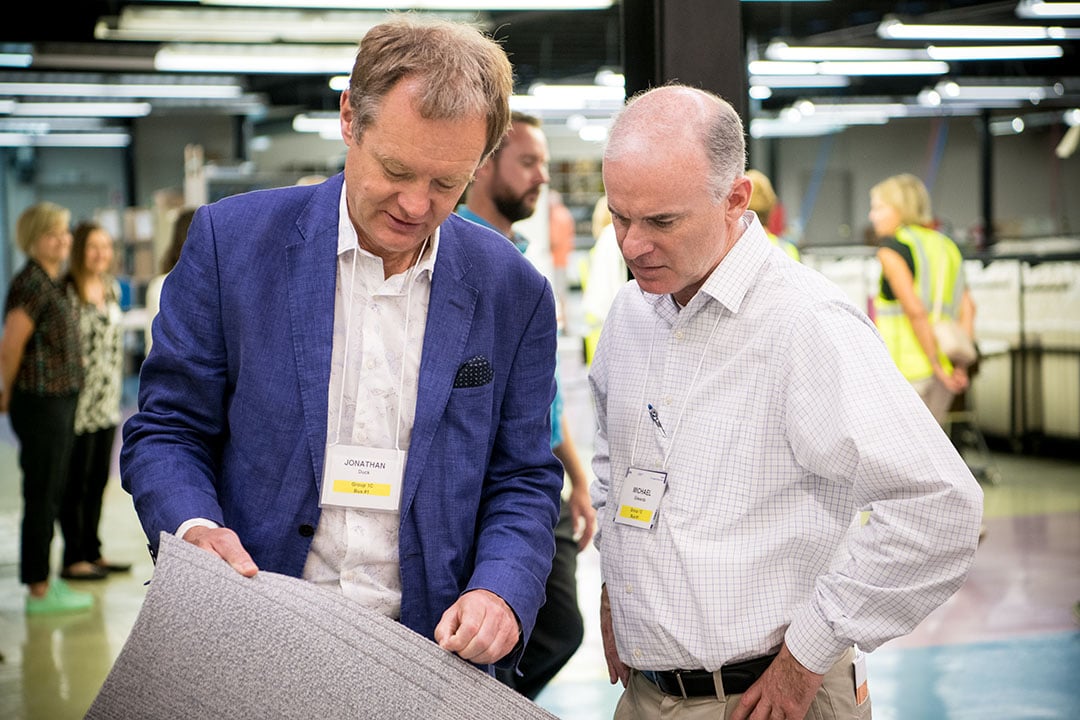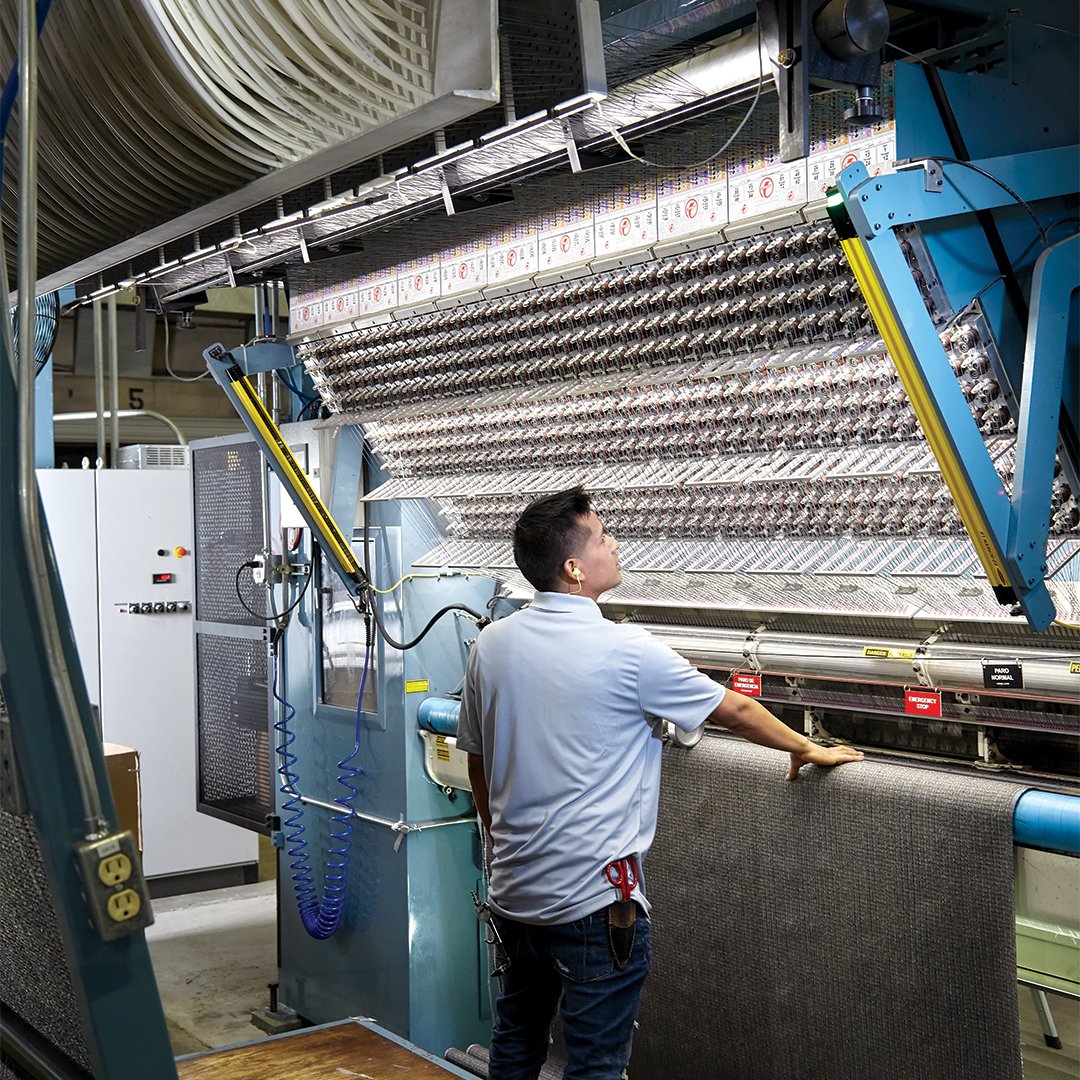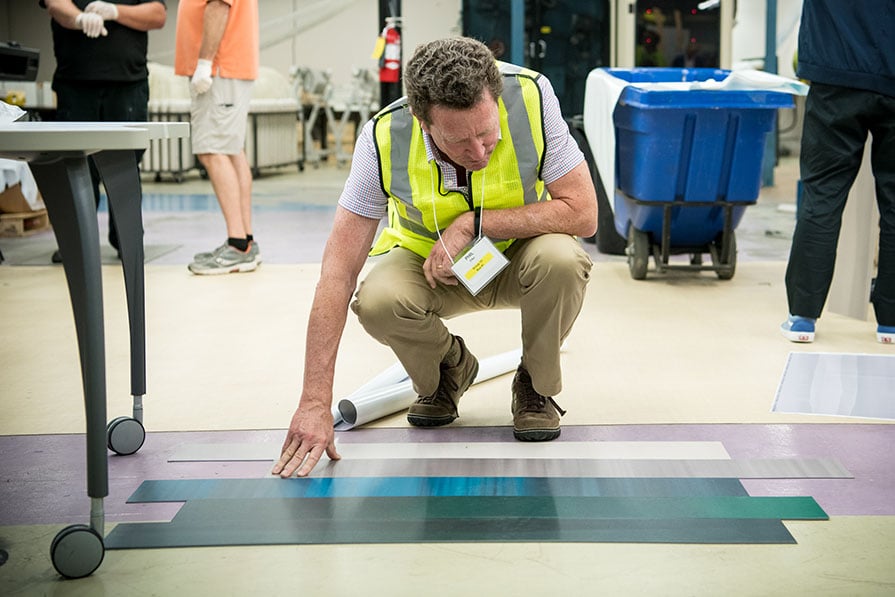At Mannington one of our core values is, “control your own destiny.” The destiny we want is one with consistently high-quality products and satisfied clients. In order to guarantee these outcomes, Mannington Commercial manufactures the majority of our flooring products in the USA where we have our hands on the process from start to finish. Domestic manufacturing, while not always the cheapest or easiest option, ultimately serves our goals best.
Mannington is a family-owned company that’s been around since 1915. We’ve chosen to manufacture domestically since our start—even before it was trendy.
As the option to outsource certain categories of flooring emerged, Mannington stuck with its core values and created factories to manufacture our products right here in America. In this article I’ll explain the top benefits of being an American made manufacturer and how that impacts the Architecture and Design community (A&D) we service.
Being a domestic manufacturer means we can truly understand the raw materials that go into our flooring. In fact, we understand every part of our flooring production right down to the energy required to make it. Because we can actually see and feel the product at every step in its production, we can guarantee consistently reliable products and delivery times.

When companies outsource the manufacturing process overseas by importing finished products from Asia, they lose visibility and connection to the product. Whether they are importing from China, Vietnam, or Thailand, they lose touch with the chain of custody of raw materials and can’t be sure about the materials being used in each product. This can be problematic when it comes to quality control. It’s like cooking at home verses eating out.
When you cook at home, you can use high quality ingredients and trust what you’re eating. At a restaurant you can guess, and you can ask, but it’s hard to know for sure. If you’re able to get an honest answer, you’ll likely find they’re using less quality ingredients than you would at home. At Mannington there is no doubt, domestic manufacturing allows us to know the process in and out.
In this article we are going to discuss:

The Benefits For Our Customers
Our commercial clients are concerned not only with the quality and longevity of our products, but also with good business practices and risk management. American made products offer huge benefits in these departments.
Take supply chain issues for example, at Mannington we completely control our supply chain. If our service levels, delivery timelines, backlogs, or domestic supply chains get strained, it may add weeks to the delivery. That would be the worst-case scenario. If the same issues arise with a company that is primarily importing their products internationally, you are looking at delays for months. If I’m the commercial client, and I’m developing a facility, I am trying to minimize the issues that might arise. There is no doubt that American made is going to be more predictable and consistent, and at the end of the day minimize the risks involved.
Manufacturing domestically also affords greater flexibility in design for our customers. We can connect with our factory teams to try new colors, textures, and designs. The lines of communication are open and easily accessible. As a result, our range of offerings is impressive. We offer a greater breath of design than any of our competitors, and we can accommodate many design requests.
Related: The Global Supply Chain Crisis

Environmental and Human Impact of Domestic Manufacturing
Ownership of the whole process is huge, but there are also benefits when it comes to environmental and human impact. The United States may not be perfect, but we are a world leader in terms of responsible and quality manufacturing. If you’re outsourcing manufacturing to China or Thailand, you don’t know the environmental impact your manufacturing is having. You’re not as clear about the labor rates or safety standards. In the U.S., all these things are enhanced, because there are legal standards in place that other countries don’t have.
As a society, we talk a lot about protecting the environment and respecting peoples’ rights, but we’re not as clued into the impact of our imports. When we are talking about buying goods imported from Second and Third World countries, most buyers have not been to see the environment that their goods were created in. Take tennis shoes for example, people may be appalled to see not only the environment that the workers are in, but also the energy required to transport these items overseas.
We’re talking about moving large freight-liners across the ocean. Think about the thousands of containers of freight that fall into the ocean every year and now sit at the bottom of the sea. Think about the extra oil burned in order to transport the goods across the world. We can avoid these issues by manufacturing in America.
Another notable impact is job creation. At Mannington we believe jobs give people dignity. Our factories and offices impact American communities by literally creating jobs. And they are good paying jobs! We give pay raise opportunities, offer good job trajectories, along with great benefits.
There is skill involved in producing flooring products, and we like keeping that knowledge of the craft right here in America. It’s about looking out for each other. We make it a point to get involved in the communities where we’re located. Manufacturing at home is a win-win. It enhances our product, our communities, our planet, and our economy right here at home.

Why Other Companies Choose To Manufacture Overseas
Most American flooring companies manufacture carpet domestically, but when it comes to other flooring products like Luxury Vinyl Tile (LVT), for example, most products are imported. The reason many flooring companies import products like LVT is to save money. Buying already assembled LVT from China or Vietnam is cheaper than making it here.
Import based companies may work on a model where they try and hold large quantities of inventory in order to avoid transport delays. But what ends up happening is that you see supply chain issues when the inventory gets low. It’s much harder for international importers to get products quickly. Because of the recent pandemic, this situation has been exasperated.
There is a general shortage of building materials. If you’re importing, you have a much longer lag time in getting products. At Mannington we can move our products faster in situations like these. Not to mention, we can operate with lower inventory levels, because we are able to simply and quickly manufacture what we need when we need it.
Our clients choose Mannington because of our long-standing quality and reliability. They trust the quality of our products and appreciate the decreased risk in supply and delivery. Knowing their business is doing good in the world is icing on the cake. I don’t know of a company that doesn’t want to foster a sense of giving back.
Choosing American made building supplies gives back to our country and our communities in all the ways I’ve mentioned. When our clients choose Mannington, they’re going to be satisfied customers, and they can say they are doing good in the word. They are playing a part in protecting and preserving the environment and helping to create and sustain good American jobs. From a wholistic perspective, domestic manufacturing is a win-win for us and our customers.
Did you know that over 90% of our LVT is manufactured domestically?
Get your free guide on the basics of commercial LVT. 👇

